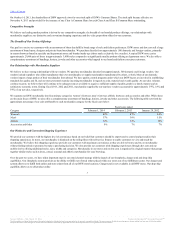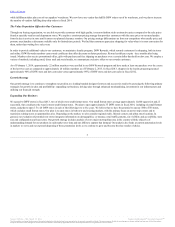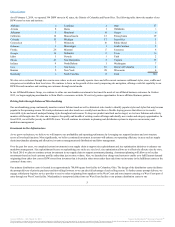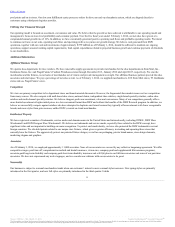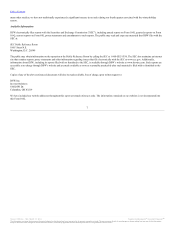DSW 2013 Annual Report Download - page 17
Download and view the complete annual report
Please find page 17 of the 2013 DSW annual report below. You can navigate through the pages in the report by either clicking on the pages listed below, or by using the keyword search tool below to find specific information within the annual report.
Table of Contents
Our amended articles of incorporation, amended and restated code of regulations and Ohio state law contain provisions that may have the effect
of delaying or preventing a change in control of DSW. This could adversely affect the value of our Common Shares.
Our amended articles of incorporation authorize our board of directors to issue up to 100,000,000 preferred shares and to determine the powers, preferences,
privileges, rights, including voting rights, qualifications, limitations and restrictions on those shares, without any further vote or action by the shareholders.
The rights of the holders of our Class A Common Shares will be subject to, and may be adversely affected by, the rights of the holders of any preferred shares
that may be issued in the future. The issuance of preferred shares could have the effect of delaying, deterring or preventing a change in control and could
adversely affect the voting power of our Common Shares.
In addition, provisions of our amended articles of incorporation, amended and restated code of regulations and Ohio law, together or separately, could
discourage potential acquisition proposals, delay or prevent a change in control and limit the price that certain investors might be willing to pay in the future
for our Common Shares. Among other things, these provisions establish a staggered board, require a supermajority vote to remove directors, and establish
certain advance notice procedures for nomination of candidates for election as directors and for shareholder proposals to be considered at shareholders’
meetings.
We do not expect a trading market for DSW Class B Common Shares to develop and therefore any investment in DSW Class B Common Shares
may be effectively illiquid, unless such DSW Class B Common Shares are converted into DSW Class A Common Shares.
There is currently no public market for DSW Class B Common Shares. DSW does not intend to list the Class B Common Shares on any securities exchange
or any automated quotation system. As a result, there can be no assurance that a secondary market will develop, and we do not expect any market makers to
participate in a secondary market. Trading activity, if any, in the DSW Class B Common Shares will be very limited. Because the DSW Class B Common
Shares are not listed on a securities exchange or an automated quotation system, it may be difficult to obtain pricing information with respect to the shares.
Accordingly, there may be a limited number of buyers if a holder decided to sell their DSW Class B Common Shares. This may affect the price a holder
would receive upon such sale. Alternatively, a holder of DSW Class B Common Shares could convert them into DSW Class A Common Shares prior to
selling. However, such conversion could affect the timing of any such sale, which may in turn affect the price a holder may receive upon such sale.
If our existing shareholders sell their Common Shares, it could adversely affect the price of our Class A Common Shares.
The market price of our Class A Common Shares could decline as a result of market sales by our existing shareholders or option holders. These sales also
might make it difficult for us to sell equity securities in the future at a time and at a price that we deem appropriate. We cannot predict the timing or the size of
future sales of our Common Shares by existing shareholders or option holders.
As of February 1, 2014, there were 82.7 million Class A Common Shares of DSW outstanding. Additionally, there were 0.3 million director stock units
outstanding as of February 1, 2014 that were issued pursuant to the terms of the DSW 2005 Equity Incentive Plan. The remaining 7.7 million Class B
Common Shares outstanding are restricted securities within the meaning of Rule 144 under the Securities Act but will be eligible for resale subject to applicable
volume, manner of sale, holding period and other limitations of Rule 144. Our Class B Common Shares can be exchanged for Class A Common Shares at the
election of the holder.
The Schottenstein Affiliates, entities owned by or controlled by Jay L. Schottenstein, the executive chairman of the DSW board of directors, and
members of his family, directly control or substantially influence the outcome of matters submitted for DSW shareholder votes, and their interests
may differ from DSW’s other shareholders.
As of February 1, 2014, the Schottenstein Affiliates have approximately 48% of the voting power of the outstanding DSW Common Shares. The Schottenstein
Affiliates directly control or substantially influence the outcome of all matters submitted to DSW’s shareholders for approval, including the election of
directors, approval of mergers or other business combinations, and acquisitions or dispositions of assets. The interests of the Schottenstein Affiliates may
differ from or be opposed to the interests of DSW’s other shareholders, and their level of ownership and voting power in DSW may have the effect of delaying
or preventing a subsequent change in control that may be favored by other DSW shareholders.
13
Source: DSW Inc., 10-K, March 27, 2014 Powered by Morningstar® Document Research℠
The information contained herein may not be copied, adapted or distributed and is not warranted to be accurate, complete or timely. The user assumes all risks for any damages or losses arising from any use of this information,
except to the extent such damages or losses cannot be limited or excluded by applicable law. Past financial performance is no guarantee of future results.


